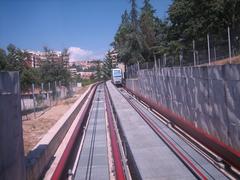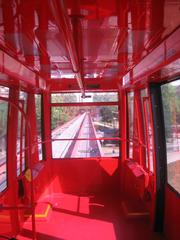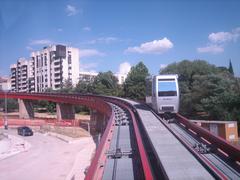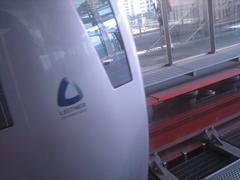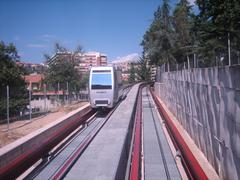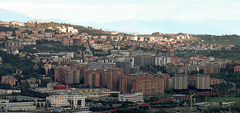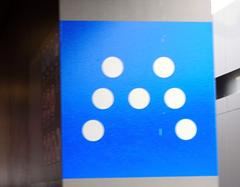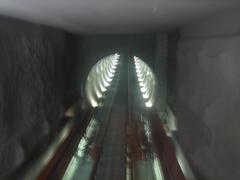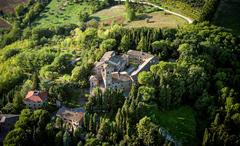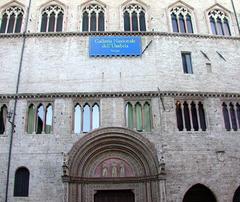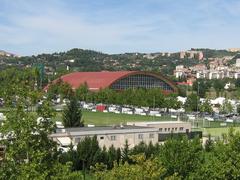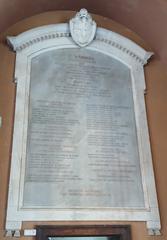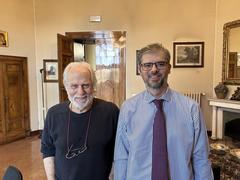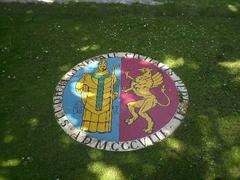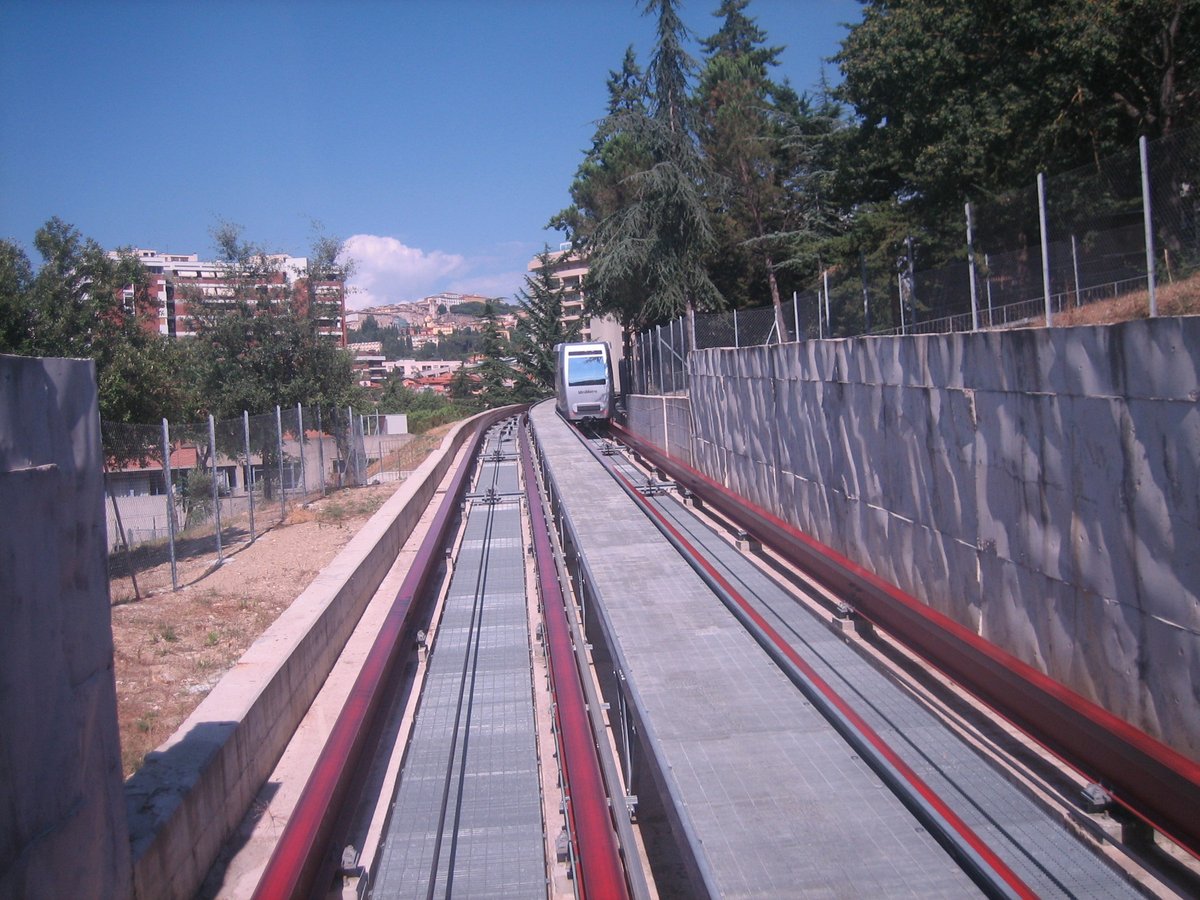
Minimetro Perugia: Visiting Hours, Tickets, and Travel Guide to Perugia Historical Sites
Date: 14/06/2025
Introduction: Minimetro Perugia—A Seamless Gateway to History and Modernity
Perugia, the capital of Umbria, is a city celebrated for its medieval architecture, vibrant cultural scene, and dramatic hilltop setting. Navigating its steep streets and ancient alleys once posed a challenge for both residents and visitors. Enter the MiniMetrò: an eco-friendly, automated light rail system that elegantly connects the city’s contemporary outskirts with its historic heart. Designed by renowned architect Jean Nouvel, the MiniMetrò is more than just a means of transport—it is an architectural and technological landmark that enhances accessibility, reduces congestion, and provides a uniquely scenic journey through Perugia’s urban landscape (mapa-metro.com; jeannouvel.com). This comprehensive guide details everything you need to know to make the most of your visit, from operating hours and ticketing to nearby attractions and accessibility features.
Table of Contents
- Overview of the MiniMetrò
- Historical Context and Urban Integration
- Design, Architecture, and Technological Innovation
- Stations and Route Highlights
- Operating Hours
- Tickets and Travel Tips
- Accessibility and Inclusivity
- Key Historical Sites Accessible via MiniMetrò
- Palazzo dei Priori: Visiting Guide
- Frequently Asked Questions
- Practical Tips for Visitors
- Sources and Further Reading
Overview of the Perugia MiniMetrò
The Perugia MiniMetrò is an automated, cable-propelled rail line that connects the city’s western edge to its medieval center. Spanning roughly 3 km, it features seven stations, offering locals and tourists a fast, reliable, and environmentally sustainable way to traverse Perugia’s challenging terrain. Its modern design and panoramic windows provide breathtaking views of the city’s ancient skyline, making every journey an experience in itself.
Historical Context and Urban Integration
Perugia’s dramatic hills and compact urban core have long made traditional transit difficult. The MiniMetrò was conceived in the 1990s as a solution to these challenges, aiming to ease mobility, reduce pollution, and preserve the historic center (mapa-metro.com; National Geographic). Construction began in 2003, and the system opened in 2008. Today, it stands as a model for sustainable, integrated transport in a historic city setting.
Design, Architecture, and Technological Innovation
Jean Nouvel’s architectural vision for the MiniMetrò merges sleek, modern forms with Perugia’s ancient textures. Glass, steel, and concrete dominate the stations, allowing them to blend into the urban landscape while maximizing natural light and panoramic views (jeannouvel.com). Each station is uniquely designed to reflect its surroundings and ensure minimal visual impact.
Technologically, the MiniMetrò is a cable-driven, driverless system built by Leitner AG. The small cabins operate continuously, with minimal wait times and level boarding for easy access. Its energy-efficient automation and careful routing minimize environmental disruption, helping to keep Perugia’s air cleaner and its historic streets quieter (National Geographic).
Stations and Route Highlights
Key Stations
- Pian di Massiano: Park-and-ride terminal with 3,000 free parking spaces.
- Fontivegge: Direct link to Perugia’s main train station and regional buses.
- Pincetto: Gateway to the historic center, just steps from Corso Vannucci and major attractions.
Other stations, like Madonna Alta and Cortonese, connect to residential and sports districts. The full journey from Pian di Massiano to Pincetto takes about 7–10 minutes, with trains departing every 3 minutes during peak hours.
Operating Hours
- Monday–Saturday: 7:00 AM – 9:05 PM (last ride)
- Sundays and Holidays: 9:00 AM – 8:45 PM (last ride)
- Extended Hours (Special Events): During large city events (e.g., Umbria Jazz Festival), hours may be further extended for crowd management (visititaly.eu).
Tickets and Travel Tips
- Single Ticket: €1.50 (valid for 70 minutes)
- Unlimited Passes: Daily, multi-ride, and monthly options available
- Integrated Tickets: UP-UNICO PERUGIA covers both MiniMetrò and Busitalia services
- Where to Buy: Automated multilingual machines at all stations or via official mobile apps
- Validation: Scan tickets at entry gates; no additional stamping required (luoghidavedere.it)
Travel Tips:
- Visit during off-peak hours (mid-morning/early afternoon) for a quieter ride.
- Park at Pian di Massiano to avoid city center traffic.
- Enjoy panoramic city views, especially between Cortonese and Pincetto.
Accessibility and Inclusivity
The MiniMetrò is fully accessible, equipped with ramps, elevators, tactile paving, and (since December 2024) an automatic vocalization system for visually impaired passengers (Perugia Tomorrow). Strollers, wheelchairs, and bicycles are welcome, and pets on leashes are permitted. Stations feature clear signage and wayfinding graphics developed by Zup Studio (Zup Studio).
Key Historical Sites Accessible via MiniMetrò
- Piazza IV Novembre: Vibrant medieval square near Pincetto station.
- Corso Vannucci: Main pedestrian thoroughfare lined with shops, cafes, and historic buildings.
- Basilica of San Domenico and Perugia Cathedral: Easily reached on foot from Pincetto.
- University for Foreigners: Accessible from the city center.
The MiniMetrò is an ideal starting point for walking tours and guided visits during major events or festivals.
Palazzo dei Priori: Visiting Guide
History and Significance
Palazzo dei Priori, constructed between the 13th and 14th centuries, served as Perugia’s seat of government. Its Gothic façade and the Torre del Popolo tower are city icons. Inside, the palace houses the Galleria Nazionale dell’Umbria, featuring masterpieces by Perugino and Pinturicchio (gallerianazionaledellumbria.it).
Visiting Hours and Tickets
- Hours: 09:00–19:00 daily (check the official site for updates, especially on holidays)
- Tickets: Affordable with reductions for students, seniors, and combined cultural passes; guided tours available
Getting There
- By MiniMetrò: Exit at Pincetto station and follow signs to the historic center.
- By Car: Park at Pian di Massiano and ride the MiniMetrò uphill.
Accessibility
The palace features ramps, elevators, and staff support for visitors with mobility needs.
Highlights
- Sala dei Notari: Opulent civic hall with frescoes.
- Council Chamber: Historic meeting room.
- Galleria Nazionale dell’Umbria: Premier Umbrian art from the Middle Ages to the Renaissance.
Visitor Tips
- Book tickets online to skip queues.
- Allow at least 2 hours for a thorough visit.
- Combine your tour with a stroll along Corso Vannucci or a visit to the cathedral.
Frequently Asked Questions
Q: Are MiniMetrò tickets valid on city buses?
A: Yes, with the UP-UNICO PERUGIA ticket, you can use both.
Q: How often do MiniMetrò trains run?
A: Every 3 minutes during peak times, 6–10 minutes off-peak.
Q: Is the system accessible for wheelchairs and strollers?
A: Yes, all stations and vehicles are fully accessible.
Q: Can I bring my bicycle or pet?
A: Yes, both are allowed (pets must be leashed).
Q: How do I reach the airport?
A: Take bus E007 from Fontivegge station to Perugia airport.
Q: Where is the best place to park?
A: Pian di Massiano’s free park-and-ride facility is recommended.
Practical Tips for Visitors
- Download the Audiala app for real-time schedules, ticketing, and travel updates.
- Use interactive maps (mapa-metro.com) for navigation and trip planning.
- Explore related articles about Perugia’s history, attractions, and local events for a richer experience.
- Check the MiniMetrò and museum websites for special hours or event information before your visit.
Images and virtual tours are available on official sites, enhancing your planning and anticipation for the trip.
Sources and Further Reading
- Perugia MiniMetrò Map and Guide (mapa-metro.com)
- Public Transport in Perugia (visititaly.eu)
- MiniMetrò Project Overview (jeannouvel.com)
- Energy-Efficient Urban Transport in Perugia (National Geographic)
- Galleria Nazionale dell’Umbria Official Site
- How to Reach Perugia’s Historic Center with the MiniMetrò (luoghidavedere.it)
- Minimetro Becomes Inclusive (Perugia Tomorrow)
- Minimetro Graphic Design and Wayfinding (Zup Studio)
Experience the seamless blend of history and innovation that sets Perugia apart. Let the MiniMetrò be your gateway to exploring Umbria’s treasures—efficiently, sustainably, and with unforgettable views at every turn.
